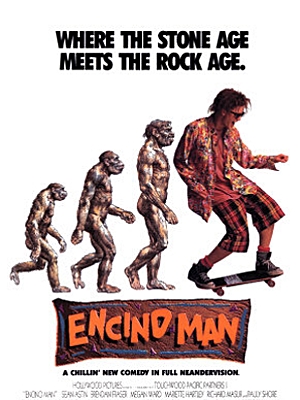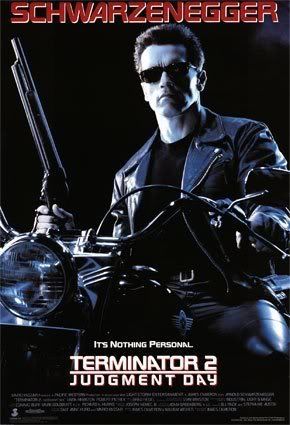
What are you supposed to do if you're not popular, the girl you like doesn't know you exist, and your best friend is an offbeat loser? Why, unearth a prehistoric man and pass him off as your cool foreign exchange student, of course. I can't even imagine there are any other solutions to this problem. It's pretty much live-in caveman buddy or bust.
1992's Encino Man passes off this storyline like it's a completely valid way to make friends and/or influence high school people. Yes, sometimes in movies we have to suspend our disbelief, but Encino Man plays it like this premise makes perfect sense. It's one thing to concede that a rozen movie caveman can be reanimated, but on another level entirely to believe that the discovery of this caveman will lead to instant high school popularity. There are just so many points that don't add up. Why couldn't Dave just be a hero for discovering the caveman? Why did he have to cover it up? Why would having a non-English speaking exchange student make you the coolest kid in school? My mind is still reeling over that one.
I adored this movie as a kid, but after watching it as an adult I'm just in awe of how little effort the filmmakers seem to be putting forth. It's like even they know it's crap. I understand it's a low budget film, but there are a lot of scenes where it feels like they're not even trying. Never mind that the research they conducted on cavemen seems to be a little lax. It's like they were trying to stage a scene, going around the room and asking for the crew members to shout out examples of things cavemen do, and then having Brendan Fraser act out those things. "Make cave drawings!" "Start a fire with two sticks!" "Okay, great, that's enough suggestions, everyone. We're just going to have him do those two things repeatedly. I know we could probably look up cavemen in the encyclopedia and see if they have any other traits, but our film budget doesn't cover the cost of the "C" volume and I don't have a library card."
Encino Man was also the film debut of the much-maligned Pauly Shore, who at the time was hosting his own MTV show Totally Pauly. Shore's brand of comedy is at best confusing and at worst grating on par with nails on a chalkboard. He has a one-note schtick involving using strange inflection and unusual variations of words, offering up such questionable colloquial gems as "buff chillage" and "fresh nugs". Don't try to think about it too hard, you'll just get a headache. As kids, not all of us were aware of how universally annoying Shore was and regrettably took up his speech patterns for awhile. Thankfully, our foray into Shore-esque chillage usually only lasted for a few weeks and then it was out of our collective systems.
The movie stars Sean Astin and Pauly Shore as a pair of geeky high schoolers in Encino, California. Dave (Astin) desperately wants to be cool, but can't seem to figure it out. In an attempt to raise his social stock, Dave decides he's going to dig a pool. Again, a perfectly logical leap. I'm sure he's totally capable of installing a full-size swimming pool despite his lack of knowledge of local zoning laws or tiling procedures. It's pretty clear this was the only set-up they could think of for the kids to find their caveman without any adults finding out about it. But I digress. Dave and Stoney (Shore) discover a cavemen buried in a block of ice and conveniently leave it on a heater. I wonder what will happen next?
Of course, Stoney and Dave come back to find melted ice and the caveman tearing up their house and painting primitive animals on everything. They give him a mini-makeover and suddenly he's their best buddy Link. Get it? Evolutionary humor is so witty. Anyway, Dave somehow manages to convince his parents that this is the exchange student they never agreed to hosting, Linkovitch Chomofsky of Estonia. I guess hosting ol' Linkovitch is nothing compared to having to deal with Stoney every night:
Miraculously, their plan works and all of their classmates think Link is incredibly cool. We never really find out why, though we're supposed to believe it has to do with his rockin' style and prehistoric good looks. All the girls go crazy for that, clearly:
Dave is trying to hook up with Robyn, and there's a whole romantic storyline that makes about as much sense as the rest of it. Robyn's unquestionably evil boyfriend Matt is displeased at the situation, but somewhere along the way Robin ends up asking Link to prom. There are a bunch of little scuffles at this point, culminating in Matt's vowed vengeance on Link and Dave. Matt tracks down some photos of Dave and Stoney posing with Link in his original caveman form and is determined to tell the school what a freak he is. Um, a few things here. First, why did they take pictures of themselves with Link as a caveman and just leave them strewn about haphazardly? Second, wouldn't Link's freakiness come second to the news that he's, well, a caveman?
We all learn the valuable lesson of Be Yourself, and Stoney, Dave, and Link are the coolest guys at the prom. How could they not be, with dance moves like these?
Robyn and Dave work it out and begin their fledgling romance at Dave's after-prom party. At the party, they discover Link's prehistoric girlfriend bathing in the bathtub, effectively closing our story with many questions. Where did she come from? How did she get unfrozen? Who taught her how to turn on the hot water and employ the necessary nudity-cover bubble bath?
It's best not to ponder these questions too much. Encino Man is supposed to be fun, and that's what it is. It never pretends to be deep or layered. It doesn't even pretend to be good. It's just the simple tale of a boy and his popularity-bolstering caveman, and that's all there is to it.












